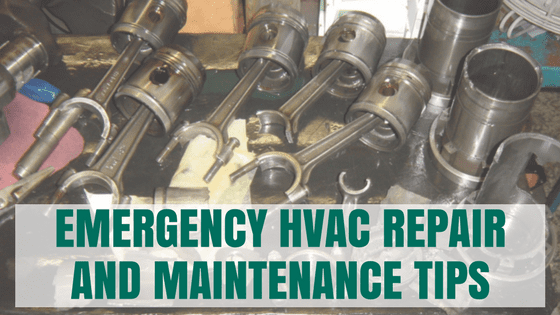Ideally, the owner or manager of a facility should never have to deal with HVAC emergency repairs. But an improperly maintained HVAC system can fail when least expected.
Because a business professional, who knows what to do when an HVAC unit suddenly stops working, can save the day, let’s go through a list of troubleshooting actions you can do on your own to try and fix your system.
Checking the Power Supply and Thermostat
Sometimes, simple issues like a malfunctioning plug or switch that powers the HVAC unit can cause it to stop working. For this reason, you should check all the plugs, switches, fuses, and breakers of the circuit supplying the power to your system in order to ensure they are in good working condition.
Also, a thermostat that isn’t working correctly can prevent the system from cycling on, cause it to function continuously, or trigger short cycling. If the thermostat is not getting power, check the power supply or replace the batteries. If the indoor temperature doesn’t match the thermostat settings, adjust the settings a few degrees below the current temperature and check if the system initiates a cooling cycle. Depending on the problems identified, you’ll be able to determine whether you can fix the issue on your own or need a professional.
Cleaning the Condenser Unit and System Components
Accumulation of dust and debris in the condenser unit can prevent an HVAC system from functioning properly. As an example, dirt buildup on the condenser coil will cause obstruction and reduce the airflow. As a result, the coil can no longer release the heat and allow the refrigerant to cool off. Besides inhibiting HVAC performance, this will eventually have very serious consequences, such as water leaks in different parts of the system, ice formation on the evaporator coil, and compressor failure. By simply cleaning the condenser unit, fans, filters, and vents, you can get your HVAC system up and running again, and prevent further damages.
Other Potential HVAC Issues You Should Be Aware Of
If the problem persists, your HVAC unit may be low on refrigerant. Because the refrigerant charge level determines the cooling capacity of an HVAC unit, an undercharge of refrigerant can prevent the system from cooling properly. However, it’s important to note that air duct problems can cause symptoms similar to that of low refrigerant levels.
Regardless of what you suspect, you should call in a professional who can identify and fix the problem, and recharge the system if required.
Under no circumstances should you attempt to recharge the unit yourself. In addition to the fact that you need a series of tools to measure the refrigerant level and charge the system, adding too much refrigerant or oil can damage the unit.
While a small amount of oil is necessary in certain compressor models, not all compressors need oil to operate. Furthermore, adding more oil than needed can:
- result in a lower refrigerant-to-oil ratio, which will hinder the heat transfer from the refrigerant to the air, with a negative effect on the cooling capacity of the system;
- make the oil accumulate in the evaporator, return in a slug to the compressor (liquid slugging), and eventually damage the compressor.
The aforementioned HVAC repair and maintenance tips can prove themselves useful in a number of situations. But because HVAC units are complex mechanical systems, calling in a technician after you restore your system to maximum functionality can help you ensure that it is in good operating condition and prevent another failure in the near future.
On the other hand, if you can’t fix the issue or you’re not comfortable performing HVAC repairs on your own, we recommend that you turn the system off and contact an experienced HVAC technician. Continuing to run your unit in improper condition can cause extensive, even irreparable damage. View the warranties.
Unfortunately, most HVAC problems tend to occur during busy periods. So, when an HVAC system fails, it’s often difficult to find a contractor who can come to fix it right away. To prevent unexpected HVAC failures and their consequences, it’s best to opt for a preventive HVAC maintenance program. Routine maintenance, will not only save you time, but it could save you money as well.












